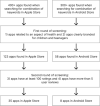Mobile Apps for Children's Health and Wellbeing: Design Features and Future Opportunities
- PMID: 38222362
- PMCID: PMC10785842
Mobile Apps for Children's Health and Wellbeing: Design Features and Future Opportunities
Abstract
Mobile health apps hold great potential for promoting children's health and wellbeing. However, there is limited understanding of how these technologies are currently designed to support children with their health concerns or wellness goals. To gain insight into the current landscape of mobile apps designed for children's health, we retrieved and reviewed 43 apps from IOS and Google Play store that are specifically marketed for children. Our qualitative analysis identified the dominant health focuses and goals of children's mobile health apps. We analyzed the primary users and their expectations as well as the methods of engagement and involvement adopted. Based on our findings, we discussed the opportunities to support children with chronic illnesses through mobile apps, design for dual use, and design for age appropriateness and digital health safety. This study provides insights and recommendations for app designers, health researchers, and policymakers on strategies for engaging children and parents while also promoting children's health and wellbeing through mobile technology.
©2023 AMIA - All rights reserved.
Figures
References
-
- Mooney CG. Theories of Childhood: An Introduction to Dewey, Montessori, Erikson, Piaget & Vygotsky. Second Edition. Redleaf Press Redleaf Press; 2013.
-
- Piaget J, Inhelder B, Weaver H. The psychology of the child. 1969.
-
- Kumar P, Naik SM, Devkar UR, Chetty M, Clegg TL, Vitak J. “No Telling Passcodes Out Because They’re Private”: Understanding Children’s Mental Models of Privacy and Security Online. Proc ACM Hum-Comput Interact. 2017 Dec 6;1(CSCW):64:1–64:21.
-
- Santer ND, Manago A, Starks A, Reich SM. Early Adolescents’ Perspectives on Digital Privacy. Algorithmic Rights and Protections for Children [Internet] 2021 [cited 2022 Oct 5]. Available from: https://wip.mitpress.mit.edu/pub/early-adolescents-perspectives-on-digit....
-
- Domingues-Montanari S. Clinical and psychological effects of excessive screen time on children. Journal of Paediatrics and Child Health. 2017;53(4):333–8. - PubMed



